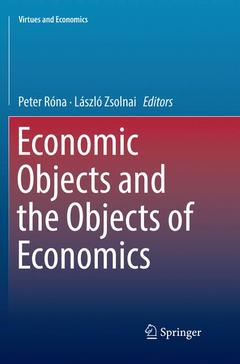Economic Objects and the Objects of Economics, Softcover reprint of the original 1st ed. 2018 Virtues and Economics Series, Vol. 3
Coordonnateurs : Róna Peter, Zsolnai László

This book examines the nature of economic objects that form the subject matter of economics, and studies how they resemble or differ from the objects studied by the natural sciences. It explores the question of whether economic objects created by modern economics sufficiently represent economic reality, and confronts the question whether tools, techniques and the methodology borrowed from the natural sciences are appropriate for the analysis of economic reality. It demonstrates the unsustainability of rational choice theory. It looks at economic agents, such as individuals, groups, legally constituted entities, algorithms, or robots, how they function and how they are represented in economics. The volume further examines the extent, if any, that mathematics can represent the objects of the economy, such as supply and demand, equilibrium, marginal utility, or the money supply as they actually occur in the economy, and as they are represented in economics. Finally, the volume explores whether the subject matter of economics ? however defined ? is the proper subject of theoretical knowledge, whether economics is an analytic or a descriptive discipline, or if it is more properly seen in the domain of practical reason. Specifically, the book looks at the importance and the ambiguity of the ontology of modern economics, temporality, reflexivity, the question of incommensurability, and their implications for economic policy.
Preface.- Part 1 Introduction; Ontology and Economics; Peter Rona.- Part 2 The Importance of Ontology.- Objects of Nature and Objects of Thought; Peter Rona.- Positioning and the Nature of Social Objects; Stephen Pratten.- Central Fallacies of Modern Economics; Tony Lawson.- Part 3 Ontology of Modern Economics.- Social Scientific Naturalism Revisited; Daniel M. Hausman.- Is Economics a Moral Science? ; Dave Colander.- New Theoretical City or Dispersed Tribes? An Exploration Journey Through Contemporary Heterodox Economics and Methodology; Carlos Hoevel.- Part 4 Temporality, Reactivity and Crowding.- Rational Choice Theory and Backward-Looking Motives; Roger Teichmann.- Time-Value in Economics; Kevin Jackson.- The Crucial Role of Reactivity in Economic Science; Bruno S. Frey.- Economic Actors and the Ultimate Goal of the Economy; Laszlo Zsolnai.- Part 5 Implications for Economic Policy.- How Does Neoclassical Economics Eliminate the Question of Fairness?; Zoltan Pogatsa.- Economics Is a Moral Science; Arjo Klamer.- Part 6 Conclusion.- Postscript on Ontology and Economics; Peter Rona.- About the Contributors.- Index.
Peter Róna
He joined the teaching staff of Blackfriars Hall in 2009, where he teaches an introductory course in economics and a more advanced one on the philosophical foundations of the social sciences. His published articles include a study of the Euro and an examination of the philosophical foundations of economics.
Laszlo Zsolnai
Laszlo Zsolnai is professor and director of the Business Ethics Center at the Corvinus University of Budapest. He is chairman of the Business Ethics Faculty Group of the CEMS (Community of European Management Schools−The Global Alliance in Management Education). He is president of the European SPES Institute in Leuven, Belgium. He has been guest professor or visiting scholar at University of Cambridge, University of Oxford, University of California at Berkeley, Georgetown University, University of Richmond, Concordia University Montreal, University of St. Gallen, Bocconi University Milan, and Netherlands Institute for Advanced Study. Laszlo ZsolnaiDate de parution : 01-2019
Ouvrage de 196 p.
15.5x23.5 cm
Date de parution : 09-2018
Ouvrage de 196 p.
15.5x23.5 cm
Disponible chez l'éditeur (délai d'approvisionnement : 15 jours).
Prix indicatif 105,49 €
Ajouter au panierThème d’Economic Objects and the Objects of Economics :
Mots-clés :
Ontology of Modern Economics; Implications for Economic Policy; Moral Question of Fairness; Objects of Economics; Modern Economics; Is Economics a Moral Science; New economic practices; Rational Choice Theory; Economic forecasts; Individual income and financial wealth; Rational Choice Theory; Lack of moral foundations at economic pedagogy; Applied economics practice; Economic theory; Social scientific naturalism with respect to economics; Reality of economic life



